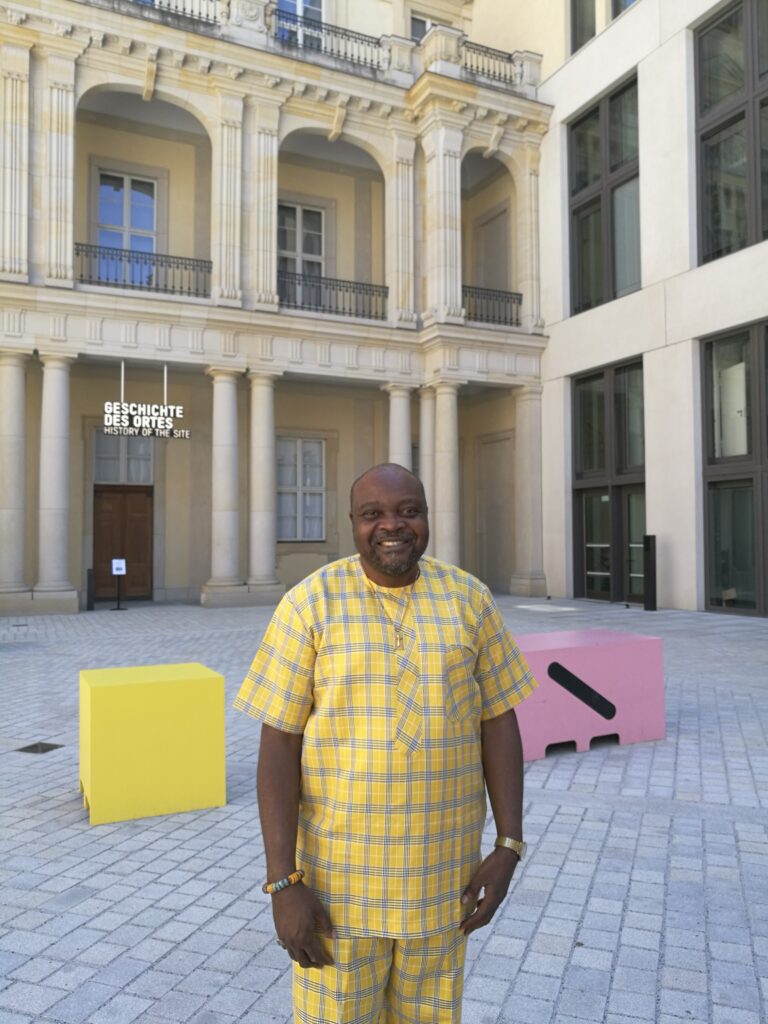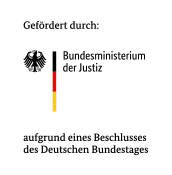Invitation
Weitere Artikel zu Ghana hier
Scroll down for Interview with Davis Mac-Iyalla: “Help us amplify our voices”
Im Juni 2022 hat Davis-Mac-Iyalla, Geschäftsführer des “Interfaith Diversity Network of West Africa” (IDNOWA) mit einer vierköpfigen Delegation von IDNOWA aus Ghana Berlin besucht und Gespräche mit Vertreter*innen von Politik und Community geführt. Zudem war er bei einer öffentlichen Veranstaltung der Hirschfeld-Eddy-Stiftung zu Gast. Wir veröffentlichen ein Interview mit Davis Mac-Iyalla: Help us amplify our voices through partnerships and direct cooperation.
Wie kam es zu Ghanas tragischer Wende zum Anti-LGBT-Extremismus?
Wie konnte es zu Ghanas tragischer Wende in Richtung Anti-LGBT-Extremismus kommen, fragte Mitte Juni 2022 die angesehene Washington Post, um gleich darauf die Antwort zu geben. Es sind die gleichen Kräfte am Werk, die 2013 für Anti-LGBTIQ+-Gesetze in Russland und 2014 für Anti-LGBTIQ+-Gesetze in Nigeria und Uganda ursächlich mitverantwortlich waren: radikale evangelikale Gruppen mit Sitz in den USA. Zuvorderst zu nennen: der World Congress of Families (WCF), den das Southern Poverty Law Center seit der Intervention in Russland als „Anti- LGBTIQ+-Hate Group“ führt.
2019 tagte der WCF in Ghana. Der ghanaische LGBTIQ+-Aktivist Alex Kofi Donkor, der die Konferenz besuchte berichtet, dass schon damals beschlossen wurde zu versuchen, eine strenge Anti-LGBTIQ+-Gesetzgebung durchzusetzen. Die Gründung eines LGBTIQ+-Centers in Accra durch die Gruppe „LGBT-Rights Ghana“ und dessen anschließende illegale Räumung waren dann willkommener Anlass, den „Gesetzentwurf zur Förderung angemessener sexueller Menschenrechte und ghanaischer Familienwerte“ (Promotion of Proper Human Sexual Rights And Ghanaian Family Values Bill) mithilfe von acht gewogenen Parlamentarier*innen, allen voran Sam George vom oppositionellen „National Democratic Congress“, im ghanaischen Parlament einzubringen. Der Entwurf sieht unter anderem Strafen für Homosexualität von bis zu zehn Jahren oder Konversionstherapien vor, verbietet die Förderung von LGBTIQ+ und bestimmt Zwangs-OPs für geschlechtlich nicht eindeutige Personen. Da der Kampf gegen LGBTIQ+ im tief religiösen Ghana so stark von radikalen religiösen Kräften geführt wird, kommt den wenigen Stimmen, die LGBTIQ+ und Glauben nicht in einem Gegensatz sehen, eine wichtige Rolle zu. Das Interfaith Diversity Network of West Africa (IDNOWA) mit Sitz in Accra, Ghana, unter seinem Vorsitzenden Davis Mac-Iyalla ist die wichtigste dieser Stimmen. Unter anderem wurde der fünfzigjährige Aktivist mit nigerianischen Wurzeln im Februar 2022 vom für den Gesetzentwurf zuständigen Komitee des ghanaischen Parlaments gehört, wo er eindringlich vor den Folgen für die LGBTIQ+-Community und für die ghanaische Gesellschaft als Ganzes warnte.
“Help us amplify our voices through partnerships and direct cooperation” Interview mit Davis Mac-Iyalla, IDNOWA
- What does IDNOWA do?
Founded in 2016, the Interfaith Diversity Network of West Africa is a regional network of activists, faith based individuals, LGBTIQ+ persons, advocates and individual activists working for inclusion of diverse persons to create a world governed by respect and dignity.
We seek a day where all persons irrespective of religious beliefs become great allies in the quest for a safe and free society for all humans. The convener of the network strongly believe that humans are born free and equal and should enjoy their full human rights and achieve their full potentials in a safe and loving society irrespective of background and belief. We hereby invite you to help connect and contribute to building this beautiful world we envision for all.
Through organizations that are members of the network (Nigeria, Ghana, Togo, Liberia, Ivory Coast, Burkina Faso, Mali, Benin, Sierra Leone, Senegal and Gambia) and duly registered, we implement initiatives on debates and dialogues on faith and rights of LGBTIQ+ persons in West Africa seeking to clarify issues for community members. We will approach differences with compassion, dialogue, education and information sharing and learning. We are a membership Network.
- Why did you come to Germany for this trip in June 2022?
We are in Germany under the invitation of HUK (Homosexuelle und Kirche), to engage with government and civil society in Ghana on the situation of LGBTIQ+ people and the Anti LGBTIQ+ Bill in our Ghana parliament.
- What are your recommendations for support for LGBTIQ+-groups in Ghana from Germany and other European countries?
Help us to amplify our voices through partnership and development cooperation directly. Most LGBTIQ+ human rights organization are working under hardship and lack of core funding.
- Should governments from donor countries use conditionality to pressure Ghana?
My answer is a capital NO, that strategy is ineffective, in fact it creates dangerous backlashes as we have witnessed in the past.
- How to fund LGBTIQ+ projects in a hostile environment with criminalization?
Start with trust and confidentiality, you can send the support and funding though your embassy or directly or through credible German civil society organizations that have links to those countries.
- How to support the LGBTIQ+ movement in Ghana? What are your recommendations for donors who want to support the movement in Ghana?
Promote direct cooperations, exchange programs, security and development training and more technical and core funding. Ask your embassies to involve LGBTIQ+ in cultural and developments programs undertaken by the embassies.
- Do you have any special recommendations for faithbased organizations in donor countries?
You can’t ignore religion, culture and tradition when talking about LGBTIQ+ human rights in West Africa and particularly Ghana in this case. The majority of the society claims to be religious so it’s important for religious and faithbased organization in donors countries to join force with us in collaboration and advocacy.
We are not inviting them to lead in speaking for us but we are inviting them to support us in changing the narrative. Faith based organizations as experts in this field should not sit back and watch while secular organizations and government are doing their best to promote a universal inclusive world. In West Africa, IDNOWA is the only Interfaith network in the grassroots and almost burning out because of lack of support from faith based organizations and institutions in donor’s countries.
- How can faith based development NGOs avoid doing harm to the LGBTIQ+-Community?
Nothing about us without us, support us to tell our stories in our languages and empower us to develop and lead our strategies.
- What can you say about the negative role of evangelical groups from the US in your country?
It’s the new form of colonialism. Our governments and leaders are brain washed and using religion as a tool to promote hate, violence and discrimination. In the name of God. Women, Sexual minorities and marginalized people in general are the biggest victims. The draconian laws and anti lgbt+ bills are all part of it.
- What do you suggest as a sustainable form of support?
Empower us and provide strategies to sustain the empowerment. Many at times your strategies lack sustainable package so progress gained don’t last.
- What do you suggest concerning the wording in project proposals: MSM, WSW, LGBTIQ+ and why?
I think the scope should be more broad to accommodate more identities. Not everyone wants to be labled but everyone needs goods and services.
- How can and should donors reach out to LGBTIQ+ organizations?
There are many roots they can use, explore and adapt the best process that does no harm but also uphold transparency and accountability. The approach that works in Ghana might not work in Nigeria that’s why research is very important.
Allow me to add that I would very much like to see more educational and skills training for activist and advocates. Many of the open minded lawyers in Ghana don’t know how to advocate on LGBTIQ+ issues. There is huge hardship and extreme poverty affecting the LGBTIQ+ community in West.
The Covid 19 pandemic restrictions might be slowing down but its economical impact and high cost of living is increasing and badly affecting the already disadvantaged LGBTIQ+ community and people in West Africa.
Davis Mac-Iyalla, director of the Interfaith Network of Westafrica IDNOWA, Ghana, Berlin, June 2022
Questions composed by Sarah Kohrt and Klaus Jetz
Links:
- Artikel zur Veranstaltung mit IDNOWA in Berlin, Juni 2022
- Ghana’s tragic turn toward anti-LGBT extremism, Washington Post June 10 2022
- „LGBTQ+ Bill — Proposed bill will promote violence” testimony by Davis Mac Iyalla before the Constitutional, Legal and Parliamentary Affairs Committee in Ghana, in Feb 2022. Ghana Web TV Mitschnitt (YouTube)
- World Congress of Families designated as extremist group/hate group by SPLC
- Southern Poverty Law Center
- WLC held a regional meeting in Ghana
- Website of the Interfaith Diversity Network of West Africa (IDNOWA)
- Anti-gay vs. gay-friendly religion go head-to-head in Ghana, Colin Stewart, March 22
- Artikel zum Webtalk der Hirschfeld-Eddy-Stiftung am 3. Dezember 2021
- How a US group with links to the far-right may have influenced a crackdown on Ghana’s LGBTQ community
- Report by Human Rights Watch: https://www.hrw.org/news/2021/08/10/homophobic-ghanaian-family-values-bill-odious-and-beggars-belief
An event by Hirschfeld-Eddy-Foundation as part of the project: “Do no harm – how to minimize risks for LGBTIQ in international human rights work”. All Articles and documentation in our blog tagged DNH-2022.




